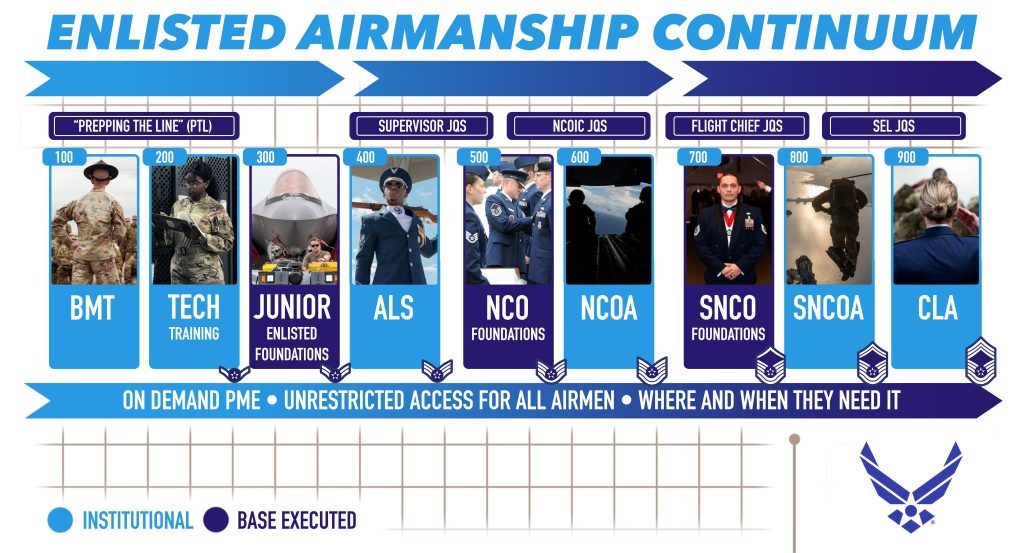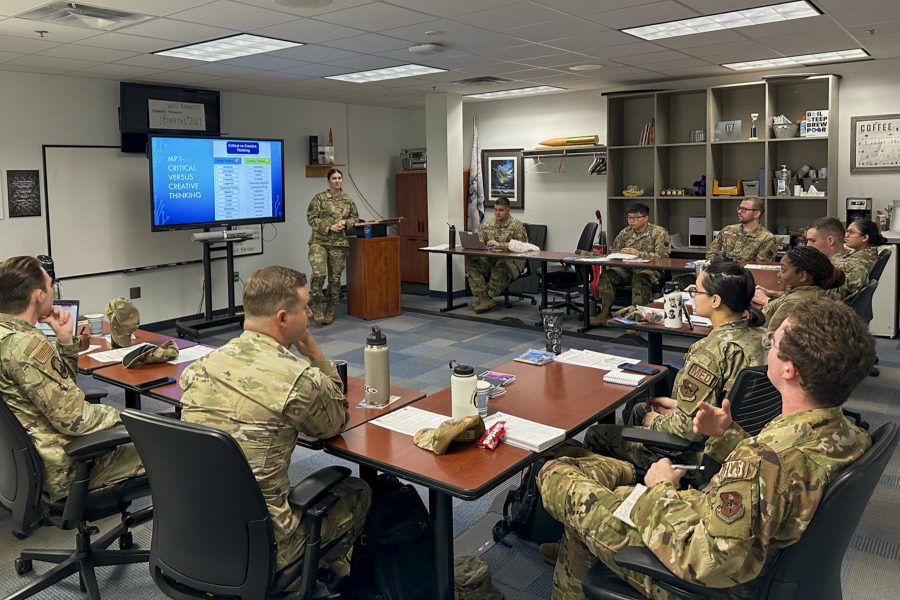The Air Force launched the enlisted Foundations courses on July 19. The program is meant to fill the years-long gap in enlisted professional military education (PME) between established schools such as the Airman Leadership School and the Noncommissioned Officer Academy.
“Some Airmen go five or six years between PME courses, which is way too long,” Col. Damian Schlussel, commander of the Thomas N. Barnes Center for Enlisted Education, which developed the curriculum, said in a July 29 press release. “These courses close that developmental gap by delivering the right content at the right time in an Airman’s career.”
There are three Foundations courses: one for junior enlisted Airmen, one for noncommissioned officers (NCOs), and one for senior NCOs. Each course is designed to prepare Airmen for new levels of leadership responsibility and help them understand strategic concepts such as Agile Combat Employment and great power competition, though the emphasis varies for each course.
For example, the 300-level junior enlisted Foundation course syllabus builds a “warrior mindset” and what it means to be an Airman, while the 500-level NCO foundation course emphasizes critical thinking and team dynamics. Meanwhile, most of the 700-level SNCO course is devoted to sharpening organizational culture and aligning with broader strategic objectives.

The five-day courses will be prerequisites for the existing schools, such as the Airman Leadership School and the NCO Academies, which Airmen must pass before advancing to higher ranks. Unlike those schools, which take place at a few dozen set locations around the world, the Foundations courses will be held at each base across the service, replacing the base-level professional enhancement seminars previously held there.
About 80 percent of each course is standardized, but the remaining 20 percent is tailored to the specific major command or wing hosting the course, the press release explained.
The Barnes Center first started testing the Foundations concept in October, after 48 representatives from all the major commands gathered for 10 days to put together the course curriculum. In the nine months since then, a few dozen instructors taught the new courses to more than a thousand Airmen across Active-duty, the Reserve, and the Air National Guard, then gathered their feedback to inform the final product.
“It was a lot of long days, weekends, and late nights for the team, but we were able to do it and do it well,” said Tech. Sgt. Kate Hytinen, the NCO in charge of the Foundations effort.
The new courses are part of a larger effort called the Enlisted Airmanship Continuum, which is meant to guide the development of enlisted Airmen.
“This shift is about the long game and building the force of the future,” wrote then-Air Force Chief of Staff Gen. Charles Q. Brown Jr. and then-Chief Master Sgt. of the Air Force JoAnne Bass when they introduced the concept in September. “We owe every Airman deliberate developmental opportunities throughout their careers to grow and become their very best.”
The continuum also includes the Prepping the Line Job Qualification Standard, an assessment that new supervisors can take to make sure they have the right skills for mentoring others, improving their unit, managing resources, and other leadership responsibilities. Another part of the effort includes on-demand online PME for anything from emotional intelligence to the budget cycle.
Enlisted Airmen “will be the difference makers in the future fight, and we are choosing to invest in them now to ensure we remain the Air Force our nation needs,” Brown and Bass wrote.
The Foundations courses are supposed to coincide with specific times in an Airman’s career. More information can be found in this July 12 memo written by force development director Crystal L. Moore.
